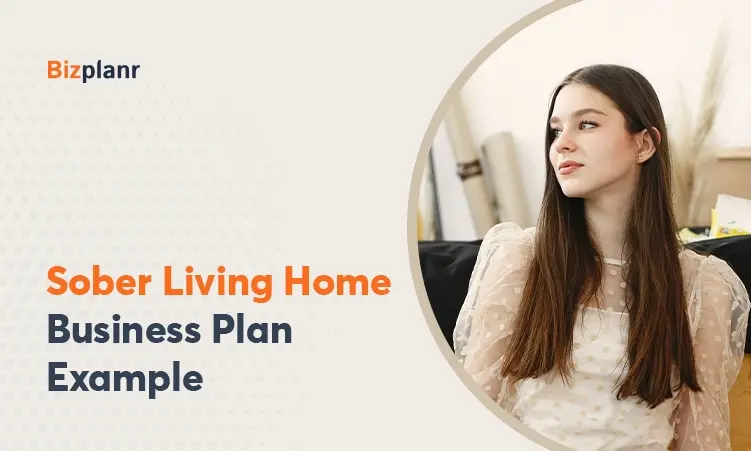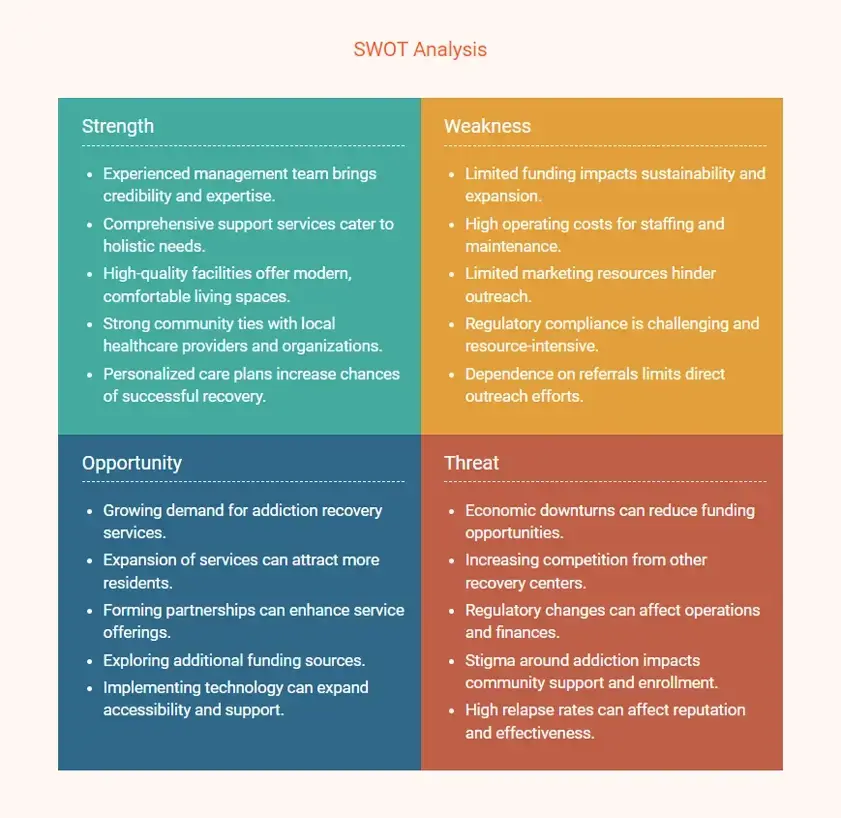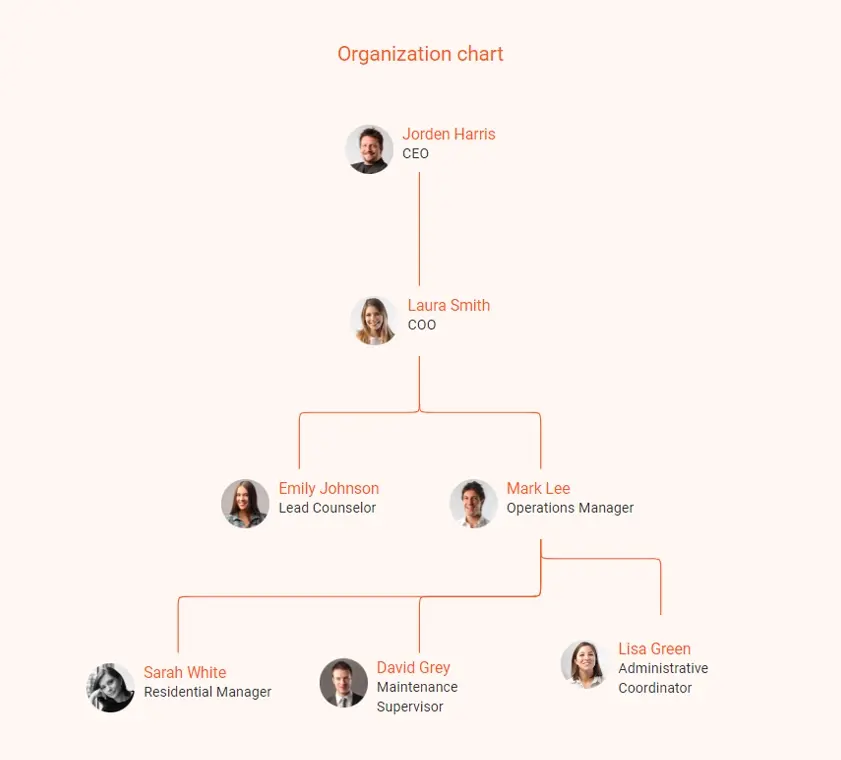
Thinking about starting and growing sober living homes? Explore this step-by-step guide and a free template that help you start drafting an actionable business plan more effectively.

Did you know that around 70% of individuals are struggling with alcoholism relapse but only 35.9% manage to recover and stay sober?
This shows the significant demand for supportive environments in the recovery process.
So, now is the perfect time to start your own sober living home if you've ever thought about helping people overcome substance abuse.
However, it requires careful planning and a well-thought-out business plan to navigate the complexities of the sober living home business and make it a success.
Need help writing your plan? Worry not!
This sober living home business plan template will be your reference point. It guides you on how to write essential sections of your plan effectively. But before that…
A sober living home business plan is a professional document that outlines all the key strategies and elements for establishing or growing a sober living facility.
Typically, it includes comprehensive market analysis, target customers, services offered to assist resident recovery, initial funding requirements, and financial forecasts—to name a few items.
Additionally, this plan illustrates the business idea and its feasibility, profitability timelines, potential risks, and growth plans for the next 5-7 years.
Simply put, it's a strategic blueprint for sober living home founders and helps them win investor's confidence and secure loans.
Whether you're planning to start a new sober living home or expand an existing one, you'll require a business plan.
Here are several key reasons why you need to create a business plan for a sober living:
Writing a business plan instills clarity on your business idea, including the mission, vision, objectives, and milestones of your sober living home.
Further, it helps you define the key metrics, such as the number of residents, occupancy rate, revenue and profit goals, and recidivism/relapse rates for estimating the success of your business.
This allows you to compare actual results against plan targets and guide your decision-making to crystallize your path to success.
Well, opening and running a sober living facility requires strict adherence to various local, state, and federal regulations.
A professional business plan enables you to analyze all the zoning laws, licensing requirements, as well as health and safety standards.
This ensures that you address all legal aspects and operate a lawful sober living home, reducing the risk of legal issues.
Once you aim to start or expand a sober living home, you'll need significant capital investment for expenses (such as property acquisition or rent, renovations, furnishings, and payroll).
With the help of realistic financial planning, you can figure out the exact funding needs for launch and early business operations.
This clearly shows the amount you seek from investors or lenders and increases your chances of getting the required funds.
While starting a sober living business, you might face fundamental risks, including resident safety concerns and local zoning issues.
However, during the planning process, you can identify and evaluate the potential challenges in operations, regulatory requirements, and legal compliance.
This will encourage you to develop effective risk mitigation strategies and address problems. Being ready with contingency plans ensure the long-term success and sustainability of your business.
A well-crafted business plan shows stakeholders (especially residents of the sober living home and their families) that your business is properly managed and dedicated to providing high-quality care.
It also helps you build confidence in private investors and banks by showing them you've carefully evaluated all the business aspects. This will increase your chances of securing the necessary capital.
So, a solid business plan enhances your business's overall credibility with potential stakeholders.
All in all, creating a sober living home business plan is very essential to guide the strategic planning and sustainable growth of your sober living home.
Bonus Read: 10 Reasons Why You Need a Business PlanWriting a sober living home business plan involves several key steps to encapsulate your business. Here’s a detailed guide on how you would write each business plan section in detail.
An executive summary provides a quick introduction and comprehensive overview of your sober living home business.
Though it's the first and foremost section of your plan, writing an executive summary at the end (once all the key sections are ready) would be more convenient.
Why? Because it summarizes the most important aspects of your sober living home mentioned in the rest of your plan.
Ideally, your executive summary must include the following details apart from introducing your company.
In short, this plan summary section should be impressive and compelling enough to capture the interest of your potential investors or stakeholders.
Read more: 11 Common Executive Summary Mistakes to AvoidThe business overview section gives an in-depth understanding of your sober living home. It highlights all the foundational elements and business-specific facts that every potential backer needs to know.
While drafting this section, you should consider including the following points:
Overall, this section presents your business concept in detail and outlines what your sober living home is all about. So, keep it concise yet engaging.
This section offers a clear picture of the industry and market in which your sober living business intends to operate. It could be residential, post-rehab, and personal-care industries.
For thorough market analysis, you've to identify the market gap first and articulate how there is a need for your business. Then, it's necessary to get valuable insights into
In addition to that, you may conduct a SWOT analysis to explore all the positive and negative aspects of your sober living home as well as devise a successful strategy for the future. For example,

Doing so will help you easily identify the internal strengths and weaknesses of your business. Moreover, it helps you recognize the industry opportunities for further growth and external threats that might affect your business’s success.
This way, you show potential investors or stakeholders that you have a good understanding of the industry, potential clients, and how to differentiate your business.
Make sure you conduct market research and feasibility studies to determine if your sober living home is viable in that chosen area.
Your sales and marketing strategies will inform readers or potential stakeholders how you've decided to promote your sober living home and reach residents. It precisely includes all the marketing tactics, objectives, and sales approaches.
But being new in the market, you'll need to make a comprehensive marketing plan and understand the costs associated with each method.
The following are a few different ways you may consider to attract and retain residents:
While summarizing your strategies, be clear and concise in your messaging as a well-crafted plan can help you grow your customer base and ensure long-term success.
As the name indicates, this section describes all the different types of services your sober living home will offer.
For instance, you may include a wide range of services, such as residential accommodation, drug testing, support and counseling, meal services, educational materials, life skill training, recreational activities, etc.
This will help readers better understand your offerings and how you plan to meet all your client’s needs and preferences. So, illustrate your services in a clear and precise manner.
In the operations plan section, you'll need to outline the day-to-day activities and processes required to run your sober living home smoothly. This will also help you achieve your business-specific goals.
So, try to draft your operational intricacies, clarify how they directly impact the quality of your services, and pique the reader’s attention.
Here’s the list of details you should incorporate in your operations plan:
Generally, this section gives a clear understanding of your business operations on a daily, weekly, monthly, and quarterly basis. So, don’t miss any essential points.
Next, highlight your sober living homes’ founders, key managers, and executive team members.
This section allows you to introduce your well-trained, strong management team, along with the professionals involved in addiction treatment, personal care, and property management.
So, consider including the roles and responsibilities, educational background, industry experience, and expertise of your executive team.
You may also create an organizational chart for the visual representation of your team structure and how the key roles interconnect. For example,

Moreover, you may describe your compensation plans and illustrate your advisory board members (if any).
Simply put, your management team section shows the capability and expertise of the individuals behind this venture and explains how they can add credibility to your business idea.
This is the most important aspect of your sober living business plan that helps you attract investors and secure funding. It offers a detailed analysis of your financial forecasts for the next few years.
Your sober living home financial plan must summarize a few critical financial statements and reports, such as:
By developing comprehensive and realistic financial projections, you allow potential backers to make informed decisions and monitor your sober living home's fiscal health and viability.
Using advanced financial forecasting software can help you formulate complex financial projections more accurately and effectively without any hassle.
The appendix of a business plan should contain additional information or supporting documents that don’t fit into specific sections but support the main content.
You should consider including the following details to make your sober living plan more compelling:
This section will enable readers to get the necessary information easily and use it as a reference.
Now, that's a wrap! We've discussed all the key components of a sober living home business plan, such as an executive summary, market research, sales and marketing plan, operational aspects, and financial projections.
So, you have a clear idea of how to write a professional business plan for your sober living home.
However, drafting a comprehensive business plan from scratch can be an overwhelming and intimidating task. This is particularly true when you’re new to this game.
But not to worry. You may consider using a free AI business plan generator to build detailed business plans more effectively.
Simply answer a few easy questions and get your plan ready in minutes!
Get Your Business Plan Ready In Minutes
Answer a few questions, and AI will generate a detailed business plan.